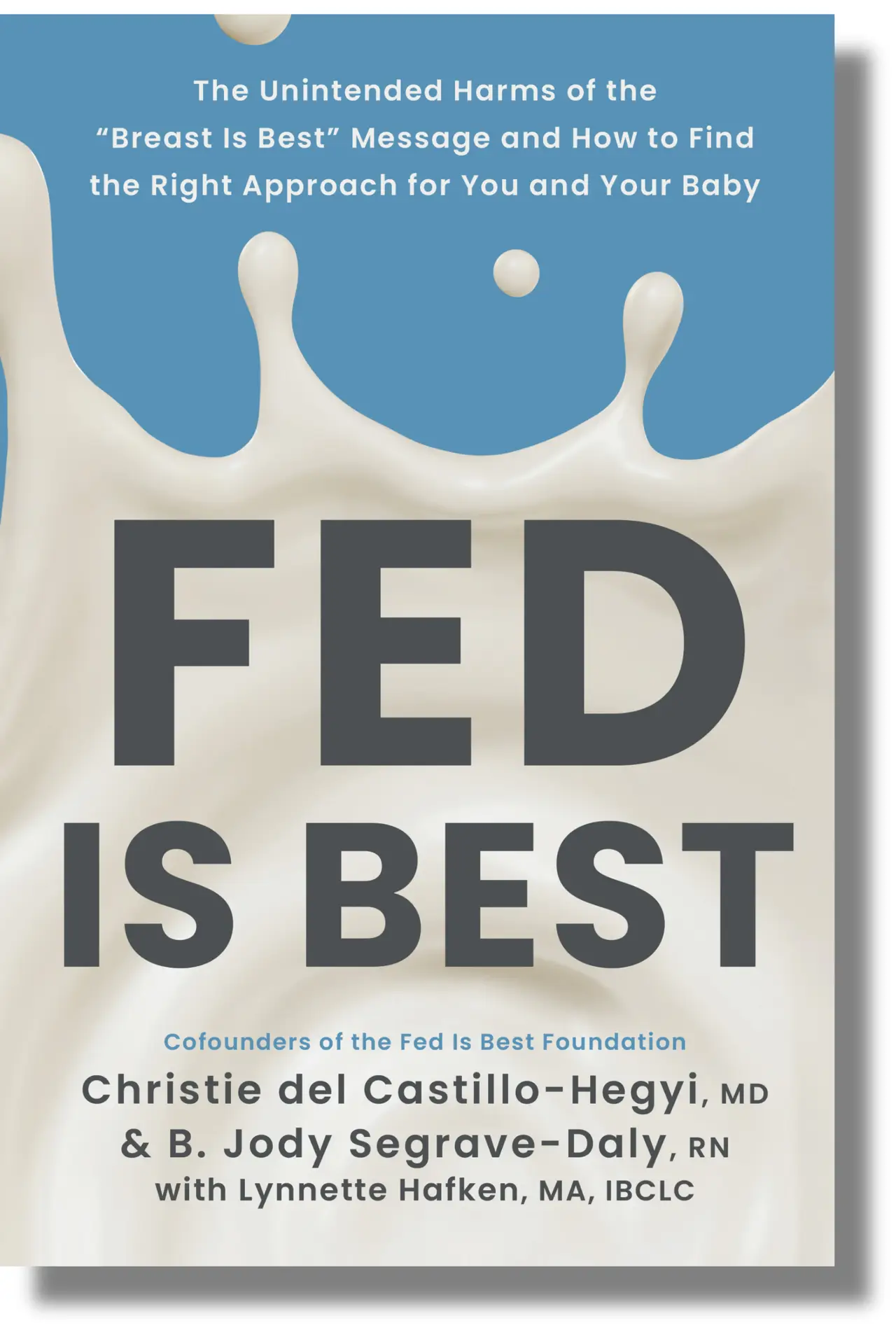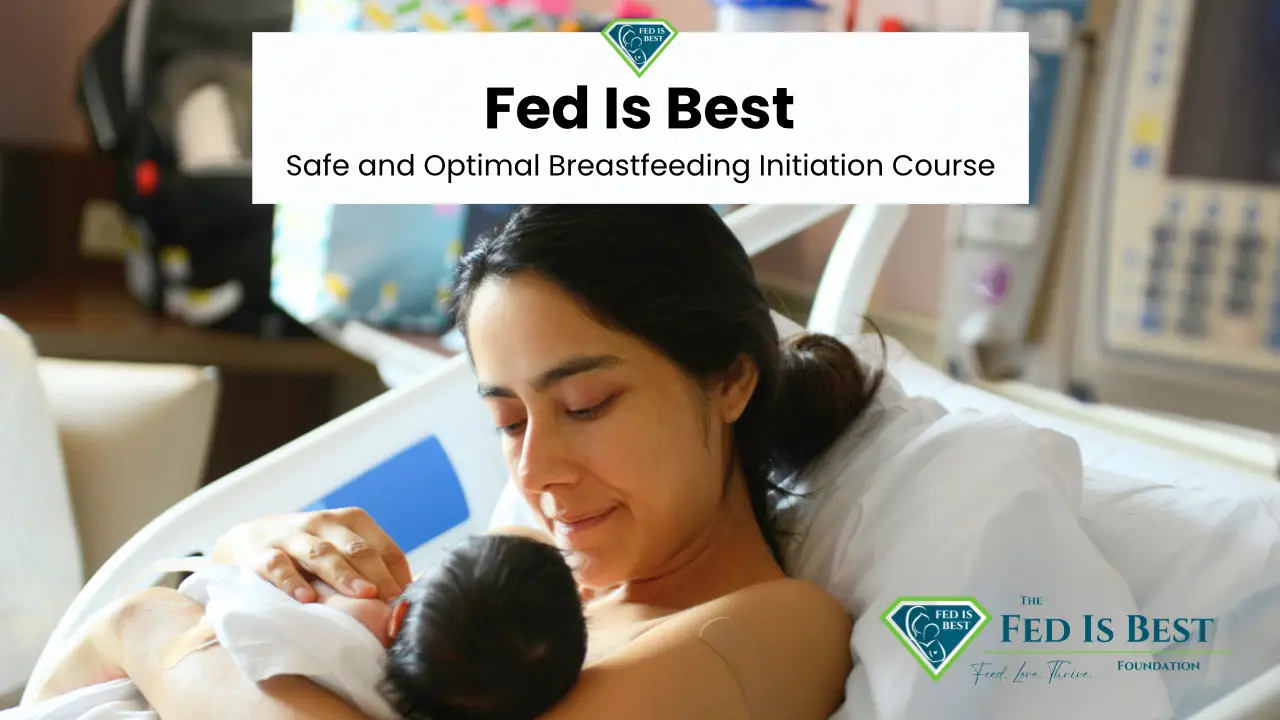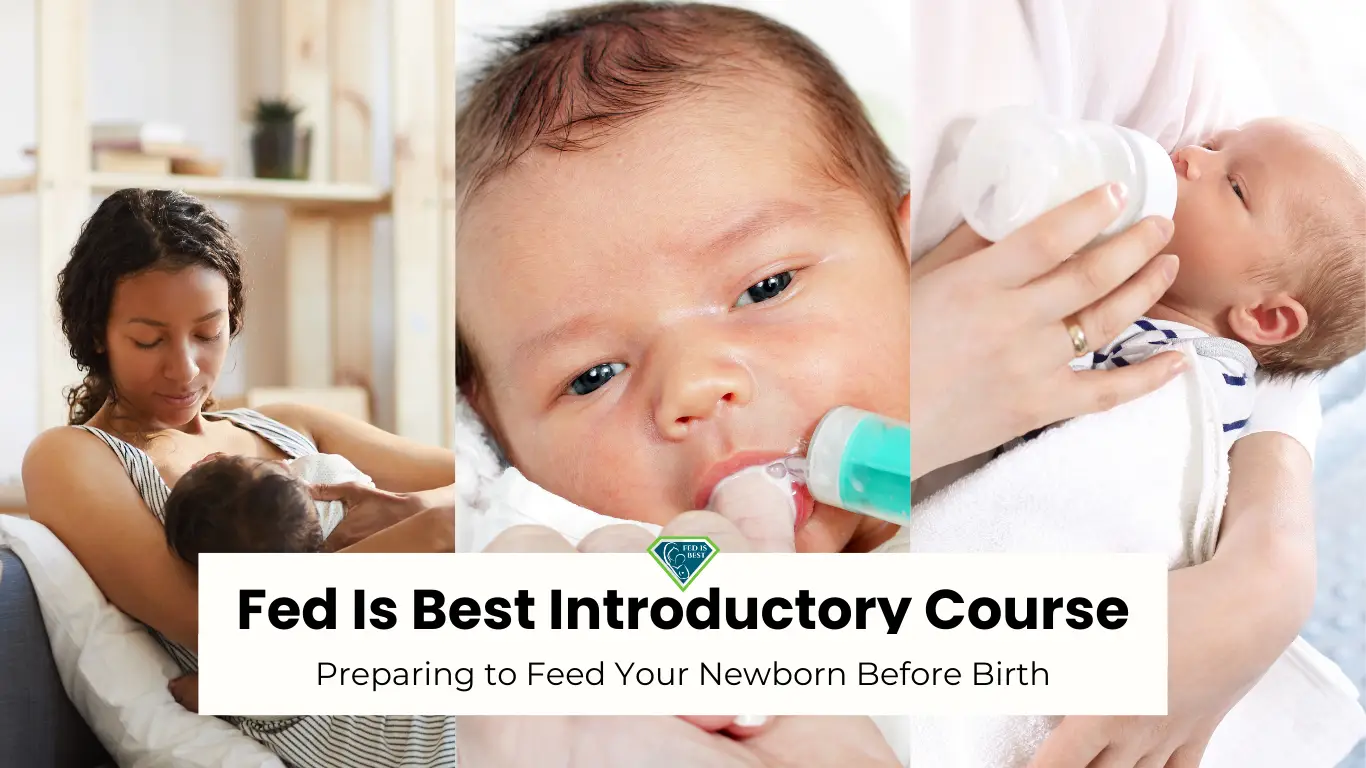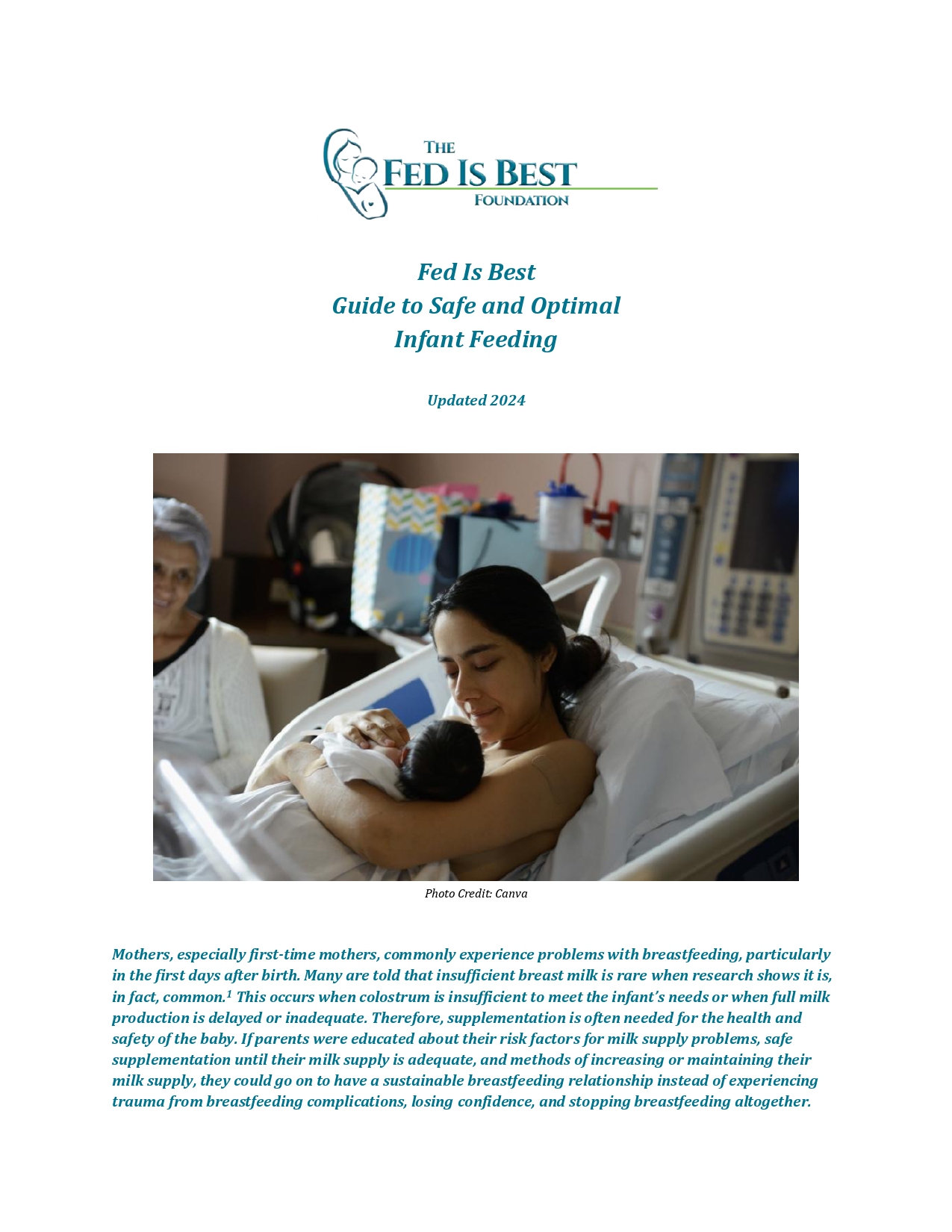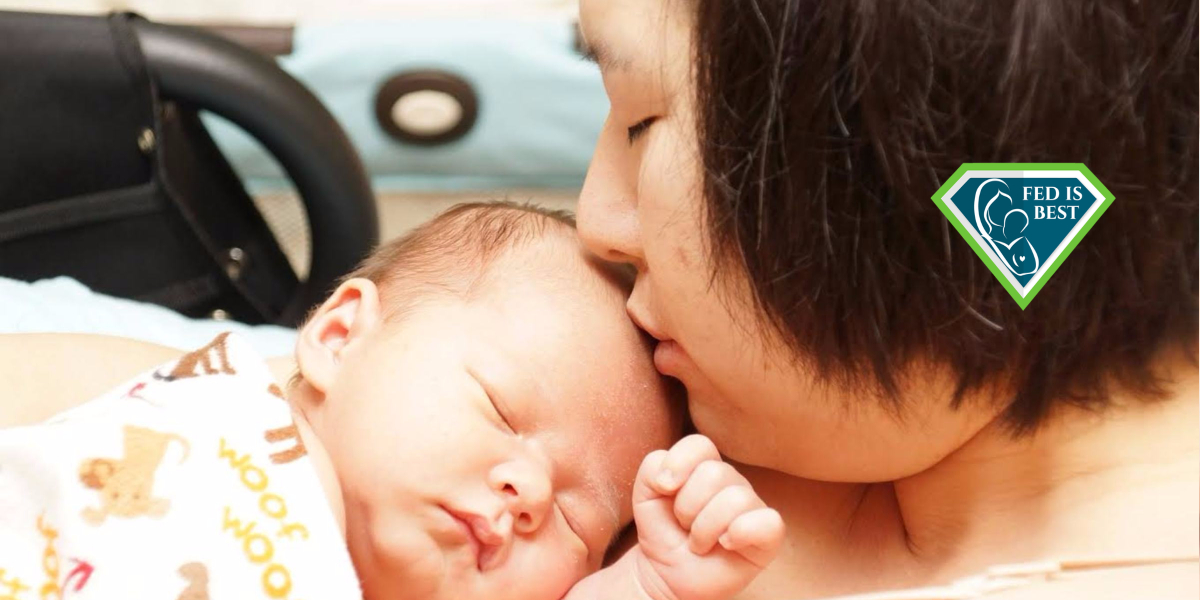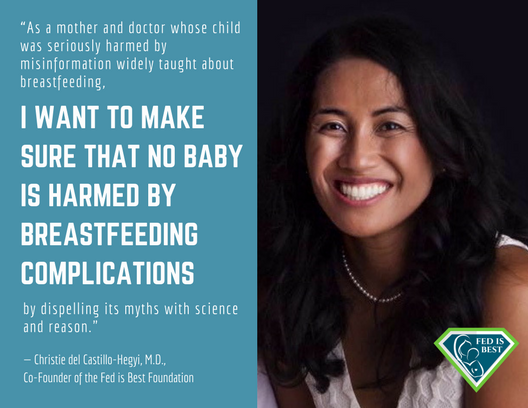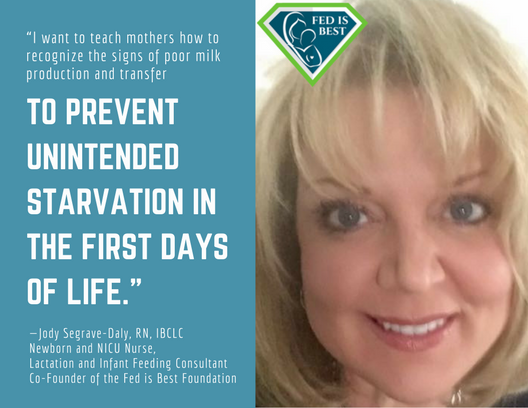
Our Mission: Safe Breastfeeding and Bottle-feeding Support
The Fed is Best Foundation works to identify critical gaps in current breastfeeding and formula feeding protocols, guidelines, and education programs. We provide families and health professionals with the most up-to-date scientific research, education, and resources to practice safe infant feeding with human milk, formula, or a combination of both. We provide families full information on the risks of insufficient milk intake and how to prevent feeding complications with supplementation while supporting exclusive breastfeeding. We also prioritize perinatal mental health and respect for parental choice when counseling parents about their feeding options. Ultimately, we recognize that every family has different needs, and every family deserves individualized, unbiased, inclusive, and shame-free support.
Read the Cofounder's Story
Listen to the Cofounder’s story while browsing and learn why Fed Is Best.
Fed is Best Photograph 2018, Abbie Fox of Fox Photography
We Are Proud to Announce the Release of the Fed Is Best Book!
“Masterfully written . . . a profound contribution to making medical complications from insufficient feeding of breastfed babies a ‘never-ever event.’ A must-read for all lactation care providers, pediatricians, and parents.”
Marianne Neifert, MD, Pediatrician and Co-Founder of the Academy of Breastfeeding medicine
Go to fedisbestbook.org or click the button below to learn more!
We Are Also Proud to Offer Two FEd Is Best Courses!
Taught by the coauthors of the Fed Is Best Book
The Fed Is Best Breastfeeding Course
Are you an expectant parent and want to succeed in breastfeeding while making sure your baby is getting all they need to be healthy and thriving?
Did you ever struggle with producing enough milk, difficulty latching, nipple pain, or a baby who was never satisfied or developed problems with adequate feeding? Were you made to feel guilty because you had to or chose to use formula to keep your baby fed?
As health professionals, we have supported thousands of parents who have felt the way you have. We have not only prepared them and helped them to overcome these struggles, but we’ve also brought them the peace of mind that making sure their baby is well-fed is the best thing they could do for their health and brain development.
We want to teach you how to get nursing off to the best possible start. But the first days of breastfeeding are the most common time when mothers and babies encounter problems.
That is why we have brought you the Fed Is Best Breastfeeding Course. For the same price as a one-hour hospital breastfeeding class that will only teach you the basics, we are giving you over 14.5 hours of comprehensive breastfeeding instruction. We teach you not only how to breastfeed with step-by-step video instruction, but we also teach how to know whether your baby is being adequately fed, and what to do if problems with feeding occur.
Here’s What You Will Learn
- Why safe and sufficient feeding is the most important goal of infant feeding for your baby’s health and brain development
- How to tell the difference between a satisfied, well-fed baby and hungry baby with video examples
- How to put together a feeding plan based on your ultimate feeding goals and how you want to address problems with breastfeeding or milk supply if they arise
- How to latch and position for optimal breastfeeding, how often and how long to breastfeed
- How to manage early breastfeeding problems like nipple pain, breast engorgement, low colostrum/milk supply, problems with latching and milk transfer to maximize your breastfeeding success
- How to supplement if breastfeeding is not enough while maintaining your breast milk supply and your baby’s ability to latch
- How to work with your health professionals to monitor your baby’s feeding with weight checks and other methods if needed
Fed Is Best Breastfeeding Course
The Free Prepare to Feed YOur Baby Before Birth Class
“No hungry babies and no judgment.”
This is our mantra. The most common time when problems with feeding occur is during the first days after birth. The most common reason why parents tell us these problems occur is because their breastfeeding and parenting books and classes did not adequately prepare them. We want to help you confidently feed your baby so that you know they are getting adequately fed.
That is why we have developed a FREE course on preparing to feed your newborn before they arrive. It includes a 14-page downloadable, printable “Fed Is Best Preparing to Feed Your Newborn” checklist to guide your preparation during pregnancy. This is a class for all expecting parents whether you plan to breastfeed, formula feed, combination feed, or feed pumped milk exclusively.
Dr. Christie del Castillo-Hegyi gives you insider information on what happens in the hospital after you deliver and how you need to be prepared for it. In this class, she discusses:
- What questions to ask on your hospital or birth center tour before you choose your where you deliver
- How to find trusted sources of information
- How to select your obstetrician or midwife and pediatrician
- What things you need to learn about infant feeding before you deliver you baby
- How to document and communicate your feeding plan with your health professionalWhat support people and feeding tools you should bring to the hospital
Fed is Best featured in the New York Times
New York Times Parenting: How to Breastfeed the First 2 Weeks of LIfe
We are honored to have been invited to write a safe, evidence-based guide, “How to Breastfeed the First 2 Weeks of Life” for the new New York Times Parenting page. Our very own Jody Segrave-Daly, RN, IBCLC, Co-Founder of the Fed is Best Foundation was invited to write this very important guide to help mothers who want to breastfeed meet their goals while ensuring their babies are safely fed and receiving all they need to thrive.
New York Times Parenting: How to Deal with Low Breast Milk Supply
Fed is Best Foundation was given the honor of contributing to the New York Times Parenting article, How to Deal with Low Milk Supply, written by Susan Reslewic Keatley. This article provides mothers with low breast milk supply safe, evidence-based ways to maintain their breastfeeding relationship while ensuring her child safely receive all the nutrition she needs.
“Estimates of the prevalence of low breastmilk supply vary. While a handful of studies suggest low supply affects 10 to 15 percent of mothers, the lactation consultants I spoke to said it is one of the top reasons they receive calls for help.”
Do ‘Baby-Friendly’ Hospitals Work for All Moms?
A small but vocal group of pediatricians and nurses, led by the nonprofit Fed Is Best, has begun to criticize some of the strategies that Baby-Friendly hospitals use, writes Carrie Arnold for NYT Parenting.
Jan. 6, 2020
Read more at the New York Times Parenting Page
Fed Is Best in FORBES MAGAZINE
Fed Is Best Foundation Says WHO Breastfeeding Guidelines Fail To Meet Human Rights Standards
On September 22nd, FIBF leaders and guests, including a neonatologist who wished to remain anonymous, and pediatric endocrinologist Dr. Paul Thornton, M.D., lead author of the Pediatric Endocrine Society’s newborn hypoglycemia guidelines, met via teleconference with top officials of the WHO Breastfeeding Program. During the conference, FIBF experts expressed concerns about complications from the BFHI, and to discuss whether WHO has plans for monitoring, research, or public outreach regarding the risks of accidental starvation.
FIBF co-founder Dr. Christie del Castillo-Hegyi, M.D., an emergency physician who researches newborn brain injury and breastfeeding, presented data on the high incidence of complications from BFHI practices and severe neurological consequences. Publicly acknowledging the common problem of insufficient breast milk and the importance of supplementation to protect the brain can prevent millions of complications, hospitalizations and newborn injuries, she implored on the call. Being fully fed is a basic human right that is not currently met by the standard of care.
When asked whether WHO plans to inform mothers of the risks of brain injury from insufficient breast milk, and that temporary supplementation can prevent complications, Dr. Rollins responded that this recommendation was not identified as a top priority.Del Castillo-Hegyi was appalled. “I cannot describe it to you in words,” she says. “Millions of babies and families in the developed and developing world have been harmed by the BFHI.”
Fed is Best Guide to Safe and Optimal Infant Feeding
Updated February 1, 2024
We are proud to present the latest edition of the Fed is Best Guide to Safe Infant Feeding. The new step-by-step guide has information on how to safely and optimally feed infants regardless of how you plan to feed them, whether exclusive breastfeeding, supplemented breastfeeding, or exclusive formula-feeding. This free printable guide, similar to a birth plan, can help you:
- make informed decisions about your infant feeding goals
- learn more about when it might be necessary to supplement based on the most current evidence on infant brain development
- prepare for unexpected events so that you can get the extra support that you or your baby needs to ensure adequate and optimal feeding during the newborn period.
You can bring it to your health professionals so that they can help you feed your baby a way that best meets their nutritional needs and honors your autonomy, your choice, as well as your physical and mental health.
Fed is Best Foundation News and Parent Stories
We have received stories from thousands of families about their infant feeding experiences both successes and challenges. We have studied these stories and the medical literature on infant feeding to provide resources to prevent infant feeding complications. We do this to help families and their health professionals feed all babies so that they thrive. Click on the picture above.
Fed Is Best Advocacy Work
Washington, DC On July 11, 2019, Dr. Christie del Castillo-Hegyi, Co-Founder of the Fed is Best Foundation and Jillian Johnson, Fed is Best Advocate and mother to Landon Johnson, who died from hypernatremic dehydration while exclusively breastfeeding, traveled to Washington, DC to provide testimonies to the 2020 USDA Dietary Guidelines Advisory Committee. This is the first year that the Dietary Guidelines for Americans (DGA) have included pregnancy and birth to 24 months.
Dr. del Castillo-Hegyi provided the Committee data on the rates of insufficient feeding complications, namely jaundice, hypernatremic dehydration and hypoglycemia among exclusively breastfed newborns and the risk of brain injury and developmental disabilities caused by those conditions. She discussed the failures in patient education and patient management that come from Baby-Friendly policies and how they result in thousands of newborn admissions a year.
Jillian Johnson spoke about her son Landon, who she attempted to exclusively breastfeed under the guidance of her Baby-Friendly hospital. He developed cardiac arrest from dehydration and underfeeding 12 hours after discharge despite 2 days of constant crying and nursing in the hospital, which her health professionals deemed normal. He died after 2 weeks on life support. She asked the Committee, “How is a mother to know if her child is in danger if everyone tells her the constant crying and nursing are normal?” She asked the Committee to put in place standard practices and patient education guidelines to prevent these complications from happening to other infants.
Information For Hospitals: Ensuring Safety for Newborns
Among the leading causes of newborn extended and repeat hospitalizations are complications of insufficient feeding in exclusively or near-exclusively breastfed newborns. The most common reasons for insufficient feeding are insufficient colostrum/breast milk production and delayed onset of copious milk production. These can lead to the complications of dehydration, excessive jaundice, hypernatremia, and hypoglycemia, which not only lead to preventable hospitalizations but can also result in impaired infant brain development. These not only put newborn patients at serious risk but also put health providers and hospitals at risk. The Fed is Best Foundation has created a page dedicated to providing information to health care providers and hospitals on how to ensure patient safety related to infant feeding, particularly for exclusively breastfed newborns. Click the photo below to learn more.
We are proud to introduce the Rush Family-Friendly Initiative!
A new alternative to hospital newborn infant feeding support
- Respectful, judgment-free support of exclusive breastfeeding, supplemented breastfeeding and exclusive bottle-feeding before and after birth
- Prenatal education and lactation support
- Support of safe skin-to-skin care, rooming-in with nurseries available on demand
- Complete patient education on all infant feeding choices and respect of parent choices
Family-Friendly Hospital Initiative
Fed is Best Foundation is a registered 501(c)3 non-profit organization with a strict policy of not accepting any funds or donations from organizations or companies that obtain revenue from infant feeding products or services, both breast- and formula-feeding. In operating this organization, we have no conflicts of interest. Neither this foundation, nor those who started or operate it, have any association with or funding from corporations, lobbying groups, or individuals associated with an industry that benefits from formula feeding. We do this to provide parents and health professionals with unbiased and safe infant feeding advice. Our organization is funded by our supporters private donations, including health professionals and parents. Our safe infant feeding education resources are provided for free because we believe that safe infant feeding is a human right and should be available to every family.
